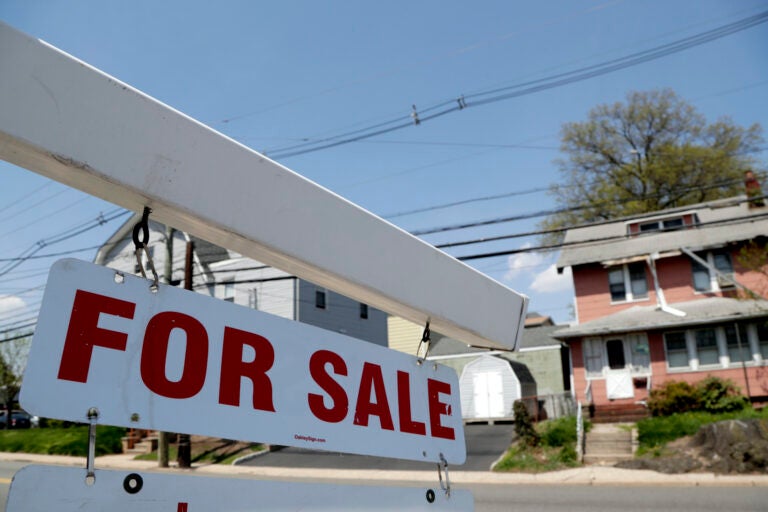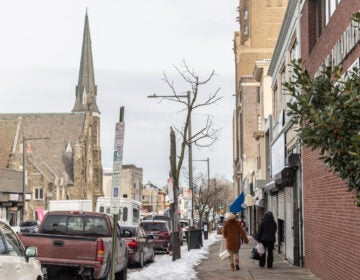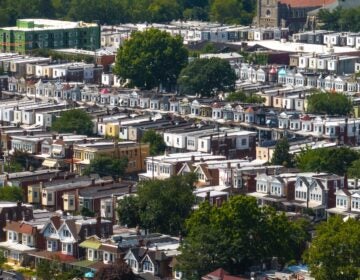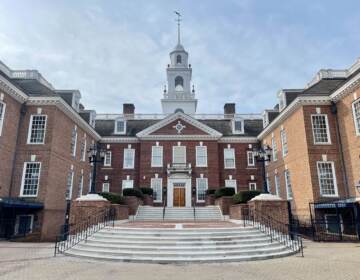N.J.’s Affordable Housing Trust Fund gets $19M boost after being starved for almost a decade
New Jersey is allocating more than $19 million to the creation of affordable housing and efforts to protect residents from eviction.

A for sale sign hangs from a post outside of a vacant business building, Thursday, May 3, 2018, in Belleville, N.J. (AP Photo/Julio Cortez)
New Jersey is allocating more than $19 million to the creation of affordable housing and efforts to protect residents from eviction.
The money will go to the Affordable Housing Trust Fund, which has been financially starved for almost a decade. The funds will then be distributed to various housing organizations in the state.
When real estate is sold in New Jersey, the seller pays what’s called a “realty transfer fee.” The money collected then goes to fund beach protection and affordable housing. But for the better part of the past decade, housing advocates say funds that should have gone to affordable housing served as a revenue source for the state budget. Former Gov. Chris Christie even proposed eliminating the transfer fee during his second term.
While Gov. Phil Murphy campaigned on reallocating money to the Affordable Housing Trust Fund, his first state budget placed $15 million in the fund and diverted $31 million to the general fund, per the Burlington County Times.
This February, however, Murphy laid out plans to allocate $60 million to the fund in the 2020 fiscal year. The $19 million is a part of that commitment with $4.7 million going to the development of 25 affordable housing units in Bordentown, $2 million for 10 units in Ocean City, and another $2 million for 10 units in Haddonfield.
In the case of Camden County’s Haddonfield, the development will be in the heart of the borough.
“Being centrally located, within walking distance to our schools, library, playgrounds, public transit and all of the conveniences of the downtown is really an accomplishment to be proud of,” said Haddonfield Mayor Neal Rochford in a statement. “We are excited to get to work on this project, and ultimately welcome new members of our community.”
For the state’s Department of Community Affairs, which administers the trust, accessibility was only one of the factors considered when funding projects.
The department said these projects had to have both private sector and community support and needed to address issues surrounding gentrification.
Funding was also intentionally awarded to “smaller rental and homeownership housing projects sized at 25 or fewer units, which often have difficulty obtaining financing.” These units are aimed at providing housing for people earning less than 80% of the area’s median income.
Staci Berger, president and CEO of the Housing & Community Development Network of NJ, said restoring funding to the trust is just one piece of a “very big puzzle to solving New Jersey’s housing crisis.”
New Jersey is one of the states where it’s hardest for a person earning $11 minimum wage to afford a modest two-bedroom apartment, per a pre-pandemic report by Berger’s organization and the National Low Income Housing Coalition.
The report found a person earning minimum wage would have to work 108 hours a week to afford a two-bedroom apartment in the state.
With the pandemic, Moody’s Analytics tells Bloomberg the average back rent owed by U.S. households sits at $6,000. And though there’s an eviction moratorium in the state, NorthJersey.com reports that Garden State landlords are ready to collect, filing more than 45,000 eviction notices between March and October.
The moratorium expires two months after the state’s public health emergency expires, which Murphy renewed for the 10th time on Monday.
“The pandemic has really laid bare the need for people to be able to keep a roof over their head for their own health and the health and safety of their communities and their neighbors,” said Berger, whose organization is receiving $1.25 million from the Affordable Housing Trust Fund.
Her organization is slated to tackle the housing crisis from another angle: helping people who face forced removal from their homes.
Her organization will use the funds to inform tenants of their rights and connect them and their landlords to mediation services outside of eviction court.
“It is almost 2021 in one of the richest states in the richest country in the history of humanity,” Berger said. “We can figure out how to make sure that our neighbors don’t become homeless.”

Get daily updates from WHYY News!
WHYY is your source for fact-based, in-depth journalism and information. As a nonprofit organization, we rely on financial support from readers like you. Please give today.






